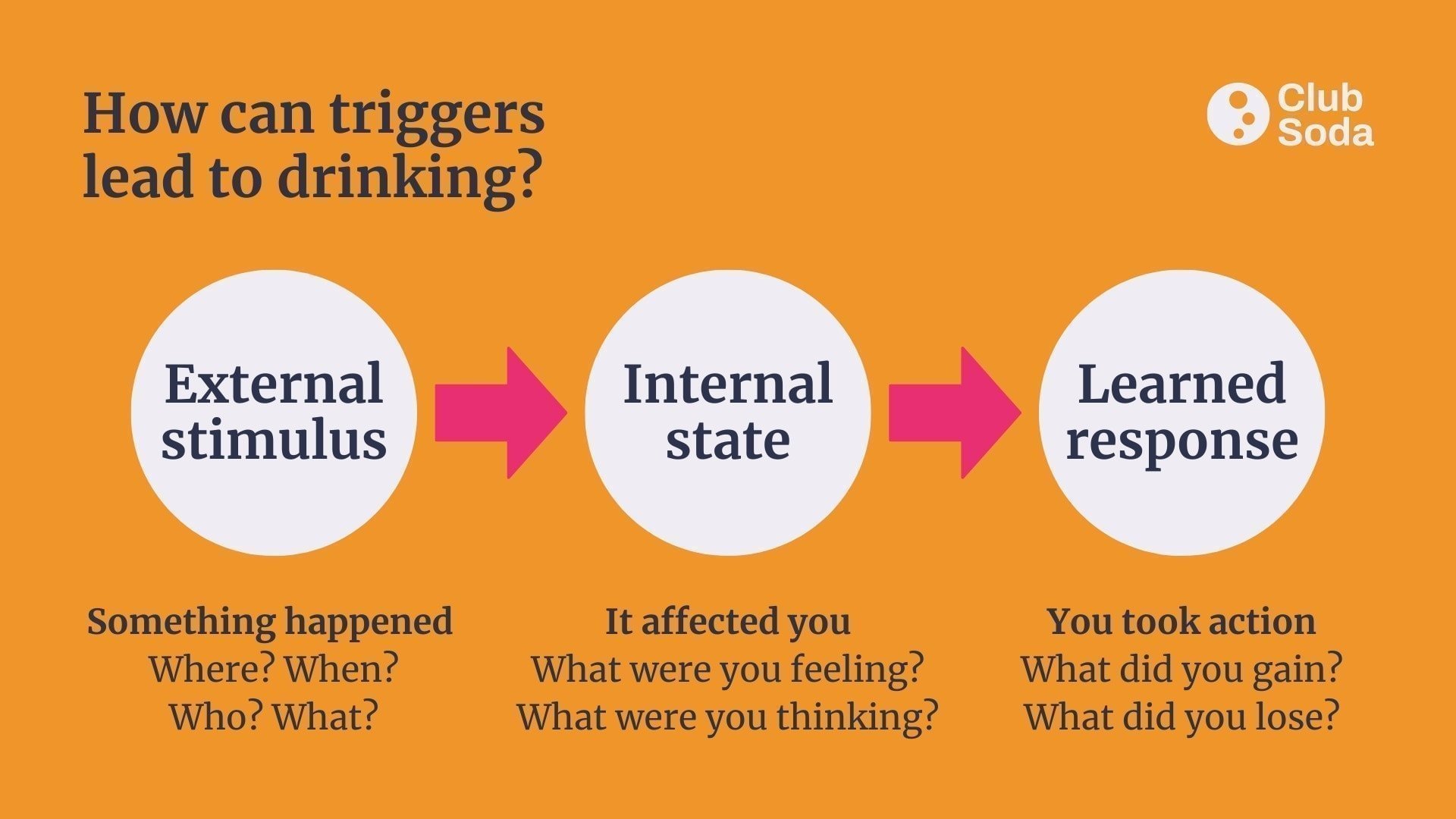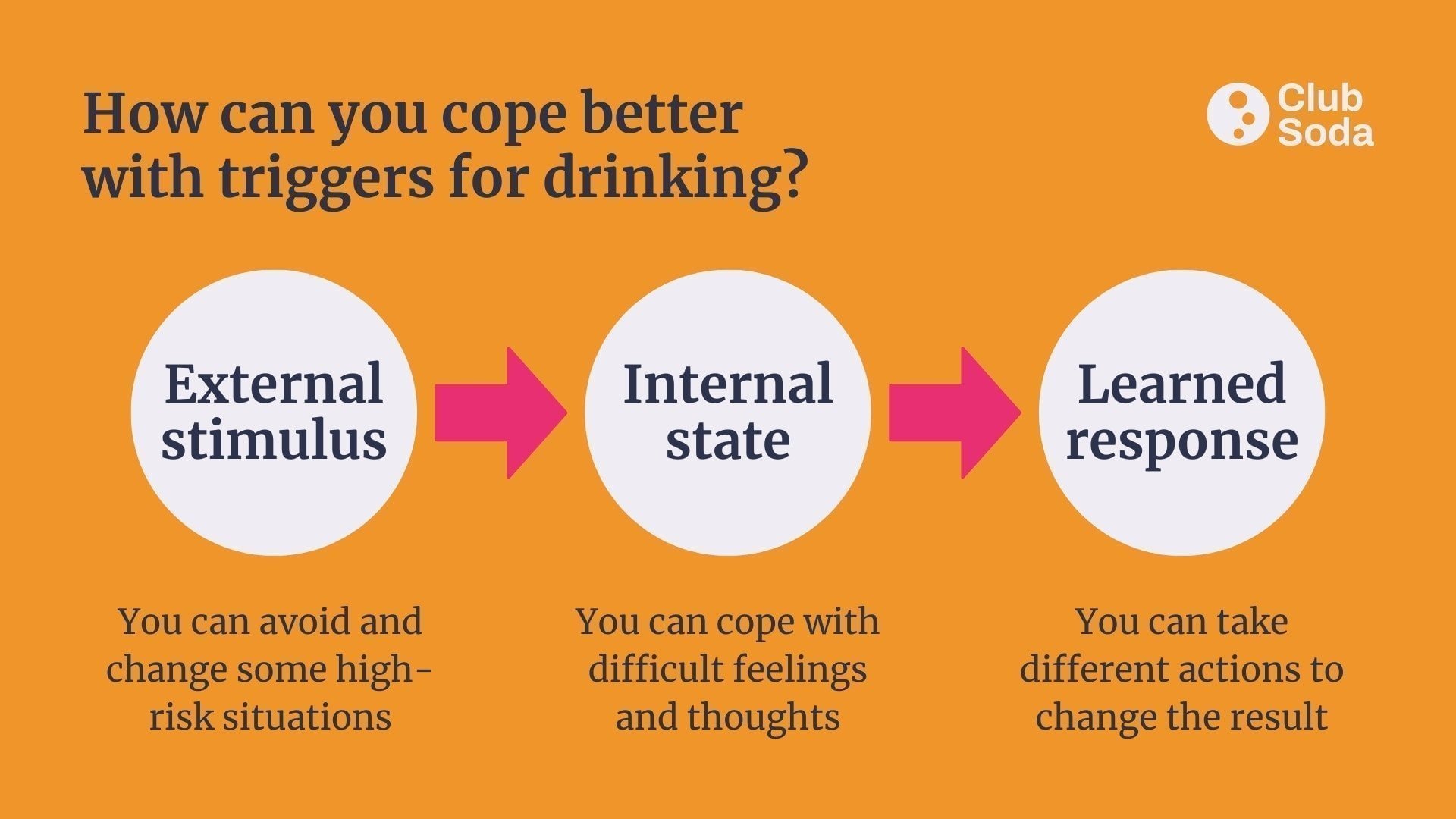
This website uses cookies to improve your experience. We'll assume you're ok with this, but you can opt-out if you wish. Read More
The Next Round: What happens after you change your drinking?

When you change your drinking by cutting down or quitting alcohol, you may suddenly notice situations where not drinking feels very difficult. Handling these triggers for drinking will be vital if you intend to drink less or not at all. But how you can practically cope when alcohol makes an appearance in your life?
Especially if you want to cut out alcohol completely, it can feel like alcohol is everywhere. And if you’re cutting back, it can be hard to control your contact with alcohol. While avoiding your triggers for drinking can be a helpful approach at first, building your confidence to deal with alcohol being around will give you more options to live your life well. So it’s essential not just to notice your triggers but also to develop practical approaches to coping with them. As your confidence grows, you can avoid unwanted drinking and put problems with drinking behind you.
This article explains what triggers are, provides tips for understanding your triggers, and offers three ways to cope with triggers for drinking.
Have you ever found yourself taking a mouthful of a drink and not being quite sure how it happened? Somewhere along the line, there was a trigger for drinking. If you find yourself unconsciously opening a bottle of alcohol and pouring a drink, you may not have noticed the trigger. But it sparked a sequence of events that led to you taking a drink.
I’ve written previously about ways to become more mindful about your drinking triggers. You can ask yourself simple questions to begin to pay attention to what’s going on when you drink more than you want to. All of us respond to different situations differently. Some circumstances make drinking hard to avoid than others. But starting to notice those situations is the key to understanding your triggers.
Triggers come in three parts:
The good news, of course, is that you can learn different approaches to dealing with triggers for drinking.
Seeing the trigger as having three separate elements – an external stimulus, an internal state change, and a learned response – can also help you understand situations in which you’ve drunk more than you wanted to.
If you’ve drunk more than you wanted to, you’re likely to feel pretty unhappy. So when you look back on those moments, always treat yourself gently. There’s a lot to learn by looking at your past experiences. But the central lesson is not that you’re a terrible human being. So be kind to yourself.
Here are some questions you can ask to understand your triggers for drinking:
Those last two questions are essential. Very often, when you feel bad about your drinking, you’ll only be able to consider the downsides of alcohol. That can lead to the conclusion that you had nothing to gain from drinking and were stupid to drink.
But you didn’t drink because there’s something wrong with you – quite the opposite. You were resourceful enough to find a solution to a complex problem. And you were doing as well as you could with the tools you had. But the answer you found ended up hurting you and maybe other people. Better solutions are available than alcohol.

There are three ways to cope better with triggers for drinking:
The first way to cope better with triggers for drinking is to avoid them altogether. Avoidance is a practical and straightforward approach. It seems obvious, but if you can avoid alcohol, you are less likely to drink.
For example, if you know that social drinking has been a problem for you, it’s OK to avoid your usual drinking places for a while. But although avoidance can be a helpful tactic, it’s good to ensure it’s not your only option. Loneliness can trigger drinking, so if cutting yourself off from social contact leaves you feeling isolated, avoiding social places could make life harder, not easier.
Avoidance can also lead to hypervigilance. Being on high alert can drain your energy. So rather than trying to avoid alcohol entirely – this is pretty much impossible in most communities anyway – focus on the high-risk situations. Reviewing your drinking triggers can quickly show you if certain places or times cause you problems or people around whom you drink more than you want to.
You can’t make alcohol disappear entirely from the world. But you don’t have to put yourself at risk in your interactions with alcohol culture.
You can also begin to take more control to change high-risk scenarios. For example, if you have a drinking buddy you want to stay connected with, you might find other ways to spend time with them that don’t centre on alcohol. You can remove alcohol from your home if you struggle with solitary drinking. You could ring ahead to restaurants to check their alcohol-free options before you arrive. You can take control.
Because the external stimulus affects you by changing your internal state, triggers can sometimes lead to unpleasant feelings and unhelpful thoughts. And if you drink to cope with these, you’re not alone. For many people, dealing with difficult thoughts and feelings is one of the prime motivations for drinking alcohol.
Beyond the early stages of alcohol withdrawal, triggers can lead to unexpected cravings for alcohol. It’s not that your body needs alcohol, but encountering a challenging situation can send you right back to thinking about drinking. But there are other ways to cope with challenging thoughts and feelings, aside from using alcohol to drown them out.
Self-care is a core skill to develop as you change your drinking. Especially in the early weeks of change, when you’re filled with excitement and energy, you can throw yourself at a world full of the possibilities of sobriety. But it can help to take things slowly, remember to nurture yourself, and take care of your physical and emotional needs. Self-care is not selfish.
And if you want to unwind in a stressful situation, you can relax without drinking alcohol. And the practice of mindfulness meditation can help you find some space inside yourself, so you can learn to observe your thoughts and feelings rather than react to them.
It’s vital too to know that you are not alone. Other people can be fantastic resource if you want to vent. Permit yourself to feel whatever you are feeling, think whatever you are thinking, and know that it doesn’t have to lead to drinking.
As I mentioned previously, even in the depths of a problem with alcohol, you haven’t been drinking because you are broken, stupid or wrong. You’ve been using alcohol to solve real problems. It’s simply now that you’re experiencing the significant downsides of that approach. And reliance on alcohol can crowd out the possibility of other choices. It’s time to get resourceful once more.
I run regular webinars, so every week, I chat with people who are at the early stage of changing their drinking. One thing that strikes me repeatedly is how often people often overlook the most straightforward solutions. It’s common to ignore the blindingly obvious, but small changes really can make a big difference. So try something out if you think something will help you change your drinking, however trivial an idea it seems. You’ll be surprised by how effective it can be.
Take social situations, for example. You find yourself in a pub, and someone offers you a drink (external stimulus). You feel an urge to drink and worry about how your friend will respond if you decline (internal state). But the simple act of asking for something alcohol-free defuses the trigger at the last minute. You can practise saying no, and you don’t have to feel guilty about it. Going to the pub and not drinking can be a revelation.
Or consider the end of your working day. You walk into your kitchen at 6pm (external stimulus), and the urge to drink hits you (internal state). You can head off this moment by changing up the start of your evening routine. Take alcohol out of your kitchen, find alcohol-free alternatives to fill your fridge, or head out for a walk around the block at the end of the day.
Changing your actions takes conscious intention, and sometimes you’ll need to draw on some old-fashioned willpower. But remember that drinking is never your only option.

Club Soda’s courses – How to Stop Drinking and How to Drink Mindfully – are designed to help you identify your triggers for drinking and develop realistic plans for change. They take you step-by-step towards a life that doesn’t centre around drinking, with in-depth lessons, practical experiments and tools to track your progress. Once you’re signed up, you can progress at your own pace, making changes when you were ready. We will nudge you every morning to keep you going. But your course access isn’t time-limited – we’re here for as long as you need us.
Plus you get an open invitation to our Wednesday webinars, so you don’t have to make changes alone. Discover how Club Soda can help you change your drinking for good, and sign up today.
This website uses cookies to improve your experience. We'll assume you're ok with this, but you can opt-out if you wish. Read More
| Name | Domain | Purpose | Expiry | Type |
|---|---|---|---|---|
| wpl_user_preference | joinclubsoda.com | WP GDPR Cookie Consent Preferences. | 1 year | HTTP |
| PHPSESSID | www.tickettailor.com | PHP generic session cookie. | 55 years | HTTP |
| AWSALB | www.tickettailor.com | Amazon Web Services Load Balancer cookie. | 7 days | HTTP |
| YSC | youtube.com | YouTube session cookie. | 55 years | HTTP |
| Name | Domain | Purpose | Expiry | Type |
|---|---|---|---|---|
| VISITOR_INFO1_LIVE | youtube.com | YouTube cookie. | 6 months | HTTP |
| Name | Domain | Purpose | Expiry | Type |
|---|---|---|---|---|
| _ga | joinclubsoda.com | Google Universal Analytics long-time unique user tracking identifier. | 2 years | HTTP |
| sbjs_migrations | joinclubsoda.com | Sourcebuster tracking cookie | 55 years | HTTP |
| sbjs_current_add | joinclubsoda.com | Sourcebuster tracking cookie | 55 years | HTTP |
| sbjs_first_add | joinclubsoda.com | Sourcebuster tracking cookie | 55 years | HTTP |
| sbjs_current | joinclubsoda.com | Sourcebuster tracking cookie | 55 years | HTTP |
| sbjs_first | joinclubsoda.com | Sourcebuster tracking cookie | 55 years | HTTP |
| sbjs_udata | joinclubsoda.com | Sourcebuster tracking cookie | 55 years | HTTP |
| sbjs_session | joinclubsoda.com | SourceBuster Tracking session | Session | HTTP |
| Name | Domain | Purpose | Expiry | Type |
|---|---|---|---|---|
| mailchimp_landing_site | joinclubsoda.com | Mailchimp functional cookie | 28 days | HTTP |
| __cf_bm | tickettailor.com | Generic CloudFlare functional cookie. | Session | HTTP |
| NID | google.com | Google unique id for preferences. | 6 months | HTTP |
| Name | Domain | Purpose | Expiry | Type |
|---|---|---|---|---|
| _ga_10XZMT03ZM | joinclubsoda.com | --- | 2 years | --- |
| AWSALBCORS | www.tickettailor.com | --- | 7 days | --- |
| cf_clearance | tickettailor.com | --- | 1 year | --- |
| VISITOR_PRIVACY_METADATA | youtube.com | --- | 6 months | --- |
Join Club Soda for 10% off your first order of drinks for UK delivery. Plus get our latest news and special offers for members to choose better drinks, change your drinking and connect with others.
If you get an error message with this form, you can also sign up at eepurl.com/dl5hPn